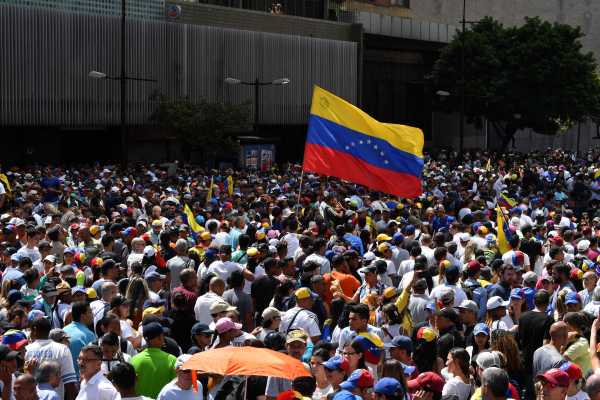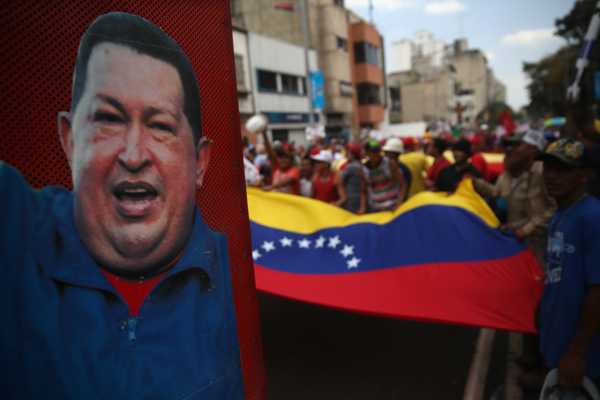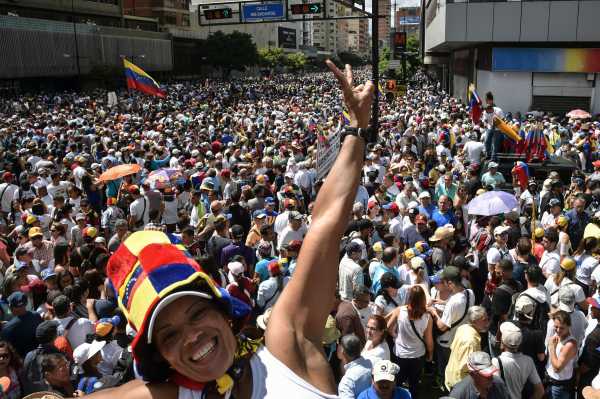
A long-time dictator and international pariah maintains he won a widely disputed election to stay in power. A fresh-faced, low-profile opposition leader calls him a “usurper” and has incited large-scale protests to hasten his ouster. And the United States — knowing the growing tensions could lead to greater violence — stokes the roaring fire from afar.
That’s the situation in Venezuela, where thousands of demonstrators plan to fill the streets on Wednesday in an effort to depose President Nicolás Maduro, the socialist leader who has overseen one of the most devastating economic collapses in the world.
The rally is mostly in support of Juan Guaidó, the leader of the country’s opposition-controlled legislative body, who has asked anti-government Venezuelans to demonstrate against Maduro.
Guaidó, along with the Trump administration and a number of other international observers, asserts that Maduro isn’t the rightful president of the South American nation. They argue that last May’s presidential election was rigged so that the dictator could win a second six-year term.
Citing Venezuela’s constitution, Guaidó and others say the sham vote means that he, as the head of the National Assembly (the country’s legislative body), is the rightful — albeit temporary — leader of the country since there’s no legitimate president. Guaidó wants the military to back him and has called for the people to protest — on the 61st anniversary of when a military dictatorship fell in Venezuela, no less — to compel Maduro’s resignation.
Guaidó says he will start to assume the presidential role and that in the future will call for new elections. He doesn’t plan to hold on to the presidency indefinitely, he says.
There are good reasons why Guaidó and the anti-Maduro movement have found an audience. Millions have fled the country due to a crippling economic downturn. Inflation is through the roof. Hunger rates have skyrocketed. And diseases once thought eradicated from Venezuela have sparked a new health crisis. Unsurprisingly, all of this and more have made Maduro an unpopular leader.
The Trump administration, which often prefers to side with dictators around the world, has taken an unusually strong interest in the power struggle in Venezuela.
Senior administration officials including National Security Adviser John Bolton and Secretary of State Mike Pompeo have publicly stated that they want to see a new government in Venezuela and that the National Assembly is the country’s only democratically elected body.
On Tuesday, Vice President Mike Pence posted a video on Twitter in which he directly addresses the Venezuelan people. Speaking in English with Spanish subtitles, Pence declared that America offers its “unwavering support … as you, the people of Venezuela, raise your voices in a call for freedom.”
Pence labels Maduro “a dictator with no legitimate claim to power,” calls the National Assembly “the last vestige of democracy” in the country, and says the US supports Guaidó’s “courageous decision” to call for Maduro to be removed from power and replaced by a transitional government.
That’s a powerful statement coming from the vice president of the United States. But Trump went one step further: on Wednesday afternoon, Trump himself put out a statement saying he recognizes Guaidó as Venezuela’s interim president.
“In its role as the only legitimate branch of government duly elected by the Venezuelan people, the National Assembly invoked the country’s constitution to declare Nicolas Maduro illegitimate, and the office of the presidency therefore vacant,” Trump said in a statement sent by the White House.
Wednesday’s demonstration, which has already led to at least four deaths, will represent the strongest pushback yet against Maduro’s unquenchable thirst for power by the citizens and officials he’s subjugated for years.
But experts caution that the odds of Maduro maintaining his grip on the country remain in the dictator’s favor, mainly because he still has a strong hold over the country’s major institutions.
“It’s most likely that Maduro will remain in power and that Venezuela will continue to worsen — remaining in its miserable, critical condition,” Ronal Rodriguez, an expert at the University of Rosario’s Venezuelan Observatory in Colombia, told me.
The protests were decades in the making
Protests have broken out throughout the country in recent years, and have picked up against in recent days. And just this week, nearly 30 Venezuelan soldiers supportive of Guaidó’s movement had their mutiny quickly thwarted. Those efforts have added to mounting unrest that in some instances set parts of the capital city of Caracas aflame.
But it’s worth pausing briefly to take a look at how the country reached this boiling point.
The roots of Wednesday’s demonstrations date back to when Hugo Chávez, the populist firebrand, took over as as president of Venezuela in 1999. He steadily pushed the country away from democracy and spearheaded the country’s experiment with socialism.
Chávez is a legendary figure in Venezuela who transformed the country’s political and economic landscape by nationalizing industries and funneling enormous amounts of government money into social programs. Under his rule, Venezuela’s unemployment rate halved, income per capita more than doubled, the poverty rate fell by more than half, education improved, and infant mortality rates declined.
And while he sparked ferocious opposition among the country’s elites and conservatives, (and from the United States), the country’s poor and working class loved him.
A massive oil boom in the early 2000s that brought roughly a trillion dollars into the country’s coffers — making Venezuela Latin America’s richest country — helped Chávez remain in power until his death in 2013.
It also gave him the space to flex his authoritarian muscles.

He stacked the country’s courts with political allies, passed laws restricting the ability of journalists to criticize the government, and consistently sought ways to remove checks on his power. However, even Chávez had his limits, and experts say he thought of the electoral system as a key way to make himself more effective as a leader.
Maduro, who was Chávez’s vice president and handpicked successor, reveres his former boss and has tried to emulate him ever since Chávez’s demise. The problem is that his attempt to recreate the Chávez era has failed spectacularly and led to a horrific economic, social, and political crisis of his own making.
When oil prices crashed in late 2014, Venezuela’s economy crashed with them. Neither Chávez nor Maduro had done anything to diversify the country’s ability to make money, instead relying almost exclusively on oil revenue to fund the state. So when oil prices suddenly took a nosedive, it helped trigger a crisis that saw the nation transform from a regional powerhouse into a failing — if not failed — state in a staggeringly short amount of time.
And Maduro has also mismanaged the country’s fiscal policy. As Venezuela expert Francisco Toro wrote for Vox in 2016:
Inflation now hovers above a million percent, and could reach 10 million percent this year. Food and medicine is too expensive for many to purchase. And since 2015, over 3 million Venezuelans have left the country in search of better opportunities elsewhere, primarily in Colombia. (It’s expected that another 2 million will become refugees in 2019 alone.)
As a result, Maduro has become deeply unpopular: His approval ratings have rarely topped 20 percent in recent years. And in December 2015, for the first time in two decades, Venezuelan voters gave opposition parties a two-thirds majority in the National Assembly. The hope was that those lawmakers would check Maduro’s power and perhaps work with him to put the country back on a better economic path.
That’s not what happened, though. Instead, Maduro fought back — and kicked off a series of events that led to his current predicament.
Maduro usurped power. Now he faces a major backlash.
The dictator and his allies made three stunning moves that demonstrate how much control he aimed to wrest for himself.
Venezuelans didn’t just sit back and let this happen without voicing their displeasure, though. They protested furiously in Caracas and throughout the country for years, clashing with Maduro’s security forces in skirmishes that led to hundreds of deaths.
Maduro, however, remained in power. He also called an election for early 2018 — a move that might seem positive at first glance, but in reality was a crafty power move intended to cement his authority even further.
As Toro explained in the Washington Post at the time, Maduro called for the early election while representatives for his government and the opposition were involved in negotiations — backed by international observers — aimed at hammering out new rules for holding freer and fairer elections.
“By announcing an election without an agreement, the regime signaled that this [wasn’t] going to happen,” Toro wrote at the time.
And, sure enough, Maduro banned two of the most popular opposition leaders, Leopoldo Lopez and Henrique Capriles, from running in the election — all but solidifying his victory. He won with 68 percent of the vote.
International organizations and many democratic countries in North and South America and Europe called the vote a sham, as did many Venezuelans. “Jesus Christ could be the candidate and Maduro would still prevail because the system is set up for him to win,” Carlos González, an anti-government activist, told the Guardian right after the vote.
That anger remained when Maduro was sworn into office two weeks ago. But it erupted in full force on January 15 when the National Assembly, headed by the 35-year-old Guaidó, called Maduro a “usurper” — stating that he was not the legitimate leader of Venezuela.
Guaidó: the unlikely resistance leader
Guaidó’s ascent is quite surprising, according to Ronal Rodriguez, the Venezuela expert in Colombia. Guaidó is not the most popular figure among the opposition — Rodriguez even said he’s seen as “third-rate” and “uncharismatic.” But pictures of him speaking to large crowds have made the industrial engineer seem like his country’s Barack Obama, Rodriguez explained, although he clearly lacks the former American president’s political skill.
But what’s made him so central to the current drama is that he claims he’s the rightful president of his country.
Guaidó cites Article 233 of Venezuela’s constitution, which basically says that if the president fails at his or her duties — or if there is an absence in leadership — the National Assembly’s chief will take temporary charge of the nation. Guaidó says he doesn’t have plans to hold onto the office permanently, but rather that he would use his authority to hold a new — and fair — elections while distributing humanitarian aid.
Maduro and his supporters, of course, scoff at Guaidó’s claims — both because Maduro won last year’s election, and because the lawmaker’s interpretation of the constitution is somewhat disputed.
Guaidó and other opposition politicians have cleverly turned this argument back around on Maduro’s government, using it to rally people to the anti-government cause by arguing the people’s will is what matters most in a democracy. At a January 11 speech in Caracas, Guaidó proclaimed: “Is it enough to lean on the constitution in a dictatorship? No. It needs to be the people, the military and the international community that lead us to take over.”
But although Guaidó has been able to rally support from everyday Venezuelas, US officials and experts tell me he’s unlikely to get the critical military support he needs to actually force Maduro from power.
The vast majority of Venezuela’s armed forces remain fiercely loyal to Maduro, officials and experts say. And on Monday, the military quickly put down an uprising from 27 anti-Maduro national guardsmen who seemingly aimed to foment the president’s ouster. While the small effort failed, it instigated protests near Maduro’s palace where, in one instance, security forces used tear gas on people who set trash on fire for a makeshift barricade.
In addition, many of Maduro’s loyalists are still in charge of the country’s most important institutions. As long as the leader still enjoys those safety blankets, he probably won’t cede or lose power.
The demonstrations may still have some effect on the country’s future, experts say. “The current protest could represent a new high water mark in terms of challenging both international and domestic perceptions of the government’s legitimacy,” Daniel Erikson, a Latin America adviser in the White House from 2015 to 2017, told me.
One country the protesters don’t have to convince of Maduro’s legitimacy deficit, though, is the United States.
The Trump administration has been anti-Maduro from the start
In August 2017, Trump told reporters at his golf club in Bedminster, New Jersey, that he was considering a “military option” for Venezuela to overthrow Maduro.
His comments, which came seemingly out of the blue, shocked pretty much everyone — not least Maduro’s government. The Trump administration also held secret meetings with rebel Venezuelan officers throughout 2018 in which they discussed plans for a potential coup, according to the New York Times.
As of now, though, there is no indication that the US is actively considering militarily intervening in the country — partly because Venezuelan opposition figures and other Latin American leaders have said they’re opposed to such a move. But even a vague threat of that happening, especially when paired with other actions the Trump administration has taken, puts serious pressure on Maduro’s government.
Since May 2017, the Trump administration has placed ever-increasing sanctions on the Maduro regime, citing issues like corruption and undemocratic practices. The financial penalties mainly target government officials in Maduro’s inner circle, and even the dictator’s wife. Experts say that while those measures do hurt the government, they also hurt the people of Venezuela, who are already suffering from the crippling economic and health crisis.

National Security Adviser John Bolton has said that the squeeze will continue until Maduro changes his ways. In a November 2018 speech that named Venezuela as part of a “troika of tyranny” along with Cuba and Nicaragua, Bolton said Maduro had to release the country’s roughly 340 political prisoners, allow for humanitarian aid to reach those in need, hold free elections, and champion the rule of law and democratic institutions before he could expect any relief.
The US even considered labeling Venezuela as a state sponsor of terrorism. The country does have ties to the Lebanese terrorist group Hezbollah and the National Liberation Army (ELN), a Marxist guerrilla group in Colombia, but it’s not known to export terrorism purposefully around the world in the same way that, for example, Iran does.
Yet despite mounting pressure, Maduro has shown no signs of giving in to America’s demands. In fact, he says the US is orchestrating a coup against him, which has led him to “revisit” his country’s diplomatic ties with the US. That doesn’t bother the Trump administration, which still actively speaks out against the regime while supporting Guaidó.
In a Tuesday Wall Street Journal op-ed released just ahead of the protests, Pence called the National Assembly leader “courageous” for speaking out. The vice president also said the situation in Venezuela is a matter of US national security because the crisis exacerbates human trafficking, international crime, and the export of drugs, weapons, and terrorism.
“For the sake of our vital interests, and for the sake of the Venezuelan people, the US will not stand by as Venezuela crumbles,” Pence wrote.
Sen. Marco Rubio (R-FL) has been among the most vocal advocating for the US to recognize Guaidó, which Trump did on Wednesday.
“As the people of Venezuela stand in support of their country’s Provisional President Juan Guaidó and their right to self-determination, I applaud their courage in rising-up against Nicolás Maduro’s narco-terrorist tyranny,” Rubio told me. “The world supports [their] fight for freedom and democracy.”
On the one hand, the US so forcefully speaking out against an odious regime is a good thing. America traditionally stands and fights for democracy around the world, at least in theory, and Maduro is clearly no democratic champion.
On the other hand, such an avid push could be dangerous. Protesters may now understandably believe that the US government — and perhaps even the US military — has their backs. That could lead demonstrators to take risks they otherwise might not, hoping America will somehow come to their aid. Unless the Trump administration somehow plans to directly intervene in Venezuela, though, that’s unlikely.
Which means that while Maduro may personally lose prestige after Wednesday’s demonstrations, he’ll still have the power to imperil his country even further.
“Venezuela’s long and painful political stress test still has no clear end in sight,” Erikson, the former White House adviser on Latin America, told me.
Sourse: breakingnews.ie
0.00 (0%) 0 votes


































